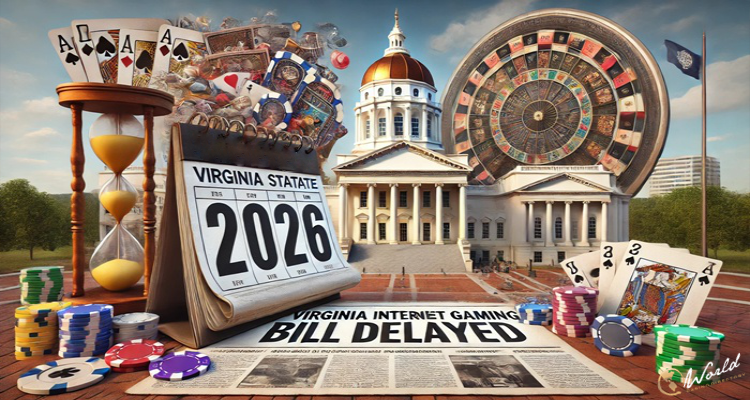Virginia lawmakers have decided to delay discussions on a bill that would legalize online gambling in the state. Senate Bill 827, introduced by Senator Mamie Locke, D-Hampton, aimed to allow the Virginia Lottery Board to issue licenses to operators for online casino gaming. The bill, which was initially set to be reviewed by the Senate Subcommittee on Gaming earlier this week, has been put on hold as lawmakers seek more time to assess its potential impact.
The purpose and potential of Senate Bill 827:
Senator Locke requested the delay, citing the need for a more comprehensive study before the proposal can move forward. In her statement, Locke explained that the bill was designed to authorize reputable, regulated companies to offer internet gaming in Virginia within a secure, legal framework. “This bill is designed to authorize reputable, regulated companies to offer internet gaming to Virginians within a safe and legal market,” Locke stated. “However, after introducing this bill, we have decided that it requires further study on this issue.”
According to the Virginia Mercury, the legislation had proposed a $1 million application fee for online gaming operators, alongside a 15% tax on their earnings. Revenue generated from online gambling would be distributed to various state and local funds. Specifically, 97.5% of the revenue would go to the state’s General Fund, with 2.5% allocated to the Problem Gambling Treatment and Support Fund. Local governments would also benefit from the new revenue streams. While this plan holds promise for creating new income for Virginia, it has sparked concerns, leading to the decision to revisit the bill by 2026.
The proposal has drawn significant scrutiny, particularly over its potential effect on existing revenue sources. The Virginia Department of Planning and Budget issued a fiscal analysis cautioning that online gambling could reduce revenues from the Lottery Proceeds Fund and the School Construction Fund. The analysis predicted that online gaming could divert consumer spending from traditional lottery sales and physical casinos, both of which contribute substantially to state finances.
The Virginia Lottery also projected that the net financial impact of online gambling would likely be negative for the state. While the bill’s supporters argue that online gaming would generate new revenue, these fiscal assessments suggest that the state may ultimately lose more than it gains. The Planning and Budget report pointed out that other states with both iLottery and iGaming have witnessed slower growth in lottery sales compared to those with only iLottery.
The proposal has also faced opposition from various stakeholders, including the Virginia Lottery, which expressed concerns over the competitive pressures that internet gaming could place on the state’s existing lottery model. This has been a key factor in the delay of the bill’s consideration.
Another issue raised in the legislative discussions is the proposed tax rate for iGaming operators. According to the fiscal report, the taxes and fees proposed in Senate Bill 827 might be insufficient to cover the administrative costs associated with regulating online gambling. The Virginia Department of Planning and Budget recommended higher taxes and fees for operators to ensure the state’s revenue from online gaming aligns more closely with the resources required for proper oversight.
Additionally, concerns about the potential criminal impact of internet gaming have also been flagged. The Virginia Criminal Sentencing Commission submitted an impact statement noting that while there is limited historical data to predict the outcomes, an increase in crime related to gambling could be expected, which would place further strain on correctional services.
A look ahead: what’s next for online gaming in Virginia?
Given the complexities surrounding the proposal, Senator Locke has decided to put the bill on hold for the time being. The legislation, which was pre-filed in late December and received its first legislative notice on January 8, is now expected to be revisited for further review by 2026.
This setback is not the first challenge faced by advocates of legalizing internet gambling in Virginia. Despite strong lobbying from online gaming supporters, no new states passed legislation for online casinos in 2024, highlighting the difficulties of expanding iGaming on the state level.
The situation in Virginia reflects a broader trend in the U.S., where while online gambling has seen significant growth in other states, concerns about its impact on traditional revenue models remain a significant hurdle.
Critics of the proposed legislation argue that Virginia needs to strike a careful balance between expanding gambling options and safeguarding its existing revenue sources, particularly the lottery. However, there is evidence from other states that suggests such concerns may be overblown. In Pennsylvania, for example, despite the growth of online casino gaming and sports betting, lottery sales hit record highs in fiscal year 2021. Similarly, New Jersey’s experience with legalizing sports betting and online gambling in 2018 did not lead to declines in lottery revenue. In fact, New Jersey’s lottery revenues saw a substantial increase during the same period.



